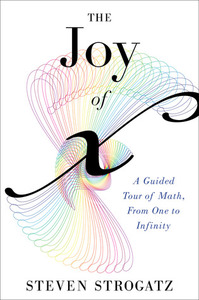Take a photo of a barcode or cover
informative
fast-paced
informative
medium-paced
Math audiobooks are kind of rare because it can difficult to verbally do math and equations and diagrams. It is therefore a big accomplishment then the wording of this book is so clear that, although it took some extra focus and occasional rewinding, it was easily comprehensible. I listened to "Infinite Power" about a year ago, and it was good, but harder to understand. I don't know whether it was the subject, the original newspaper format, the distinct (and almost descrete) sections, or the target audience, but this was better.
I am a math and science tutor and I have always loved math. So I looked forward to this book with great anticipation. It was obvious to me that this author shares a similar love and I really enjoyed listening to him talk about different concepts from the various branches of mathematics. However, I think I would have enjoyed it even more if I had been able to follow along with a written version because as much as I love and can do the math, I am very much a visual learner and I need to see the equations in order to follow them. Some of what he talked about were very familiar to me, so even though I didn't have the equations in front of me I was able to jot down notes and follow his reasoning very easily. In others, especially the chapters on calculus and series, I needed to pause and jot things down and go back and relisten to what he was saying to make sure I was following everything correctly. Despite these shortcomings, I don't regret purchasing this audiobook (it was one of the deals of the day) and I wouldn't mind listening to it again, this time following along with the written book. I am definitely part of the target audience, so I am a bit biased. Even if you're not a math expert, I still think you could get something out if this book, if only to see how mathematics can be part of every day life.
informative
medium-paced
4.25 stars
This book is broken down into lots of small chapters, each one discussing one math concept at a time in very approachable language. The book starts with very basic concepts like counting (and the history of it) and goes all the way up to college level math and hits everything in between. As an educator he did an exceptional job at explaining math in a way that I think most people would be able to grasp. On the downside, I listened to this as an audiobook and I think that some of the concepts would be easier to understand in a book format instead!
This book is broken down into lots of small chapters, each one discussing one math concept at a time in very approachable language. The book starts with very basic concepts like counting (and the history of it) and goes all the way up to college level math and hits everything in between. As an educator he did an exceptional job at explaining math in a way that I think most people would be able to grasp. On the downside, I listened to this as an audiobook and I think that some of the concepts would be easier to understand in a book format instead!
Very cool book on the beauty and ubiquity of mathematics. Covers a whole bunch of topics (literally, as the title mentions, from one to infinity) via short, entertaining, easy-to-read essays. Highly recommended, especially for folks (like me) who have a quantitative background, but never really cared to dig a few levels deeper and explore the beauty of this wonderful subject.
hopeful
informative
inspiring
lighthearted
reflective
relaxing
medium-paced
I'm so glad I wasn't tested, because I kinda rushed through the chapters on trigonometry and calculus chapters. Some of the examples were very interesting, and made me break out the notebook and work out the problem the long way, which is the way I work in best. But towards the end the chapters became shorter and shorter for more complex ideas, turning almost into a brief and boring textbook. I don't regret reading it. Just wasn't much fun towards the end.
informative
lighthearted
fast-paced
A good book, just not as good as my absolute favorite math book. That would be Charles Seife’s “Zero: Biography of a dangerous number”.



